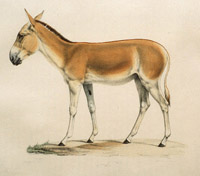
Erforschung biologischer Ressourcen der Mongolei / Exploration into the Biological Resources of Mongolia, ISSN 0440-1298
Date of this Version
2016
Document Type
Article
Citation
Erforschung biologischer Ressourcen der Mongolei (2016) band 13: 445-456.
Abstract
In November 2009, we conducted a countrywide survey for wild sheep or argali and Siberian ibex. Field survey teams sampled in total 134 argali distribution units within Mongolia, which are estimated to occupy approximately 46,603 km² of the whole area of 60,237 km² that been previously mapped as populated by argali. They observed 385 groups of argali, totaling 3.373 individuals. Our point estimate of argali is 18,140 with a lower 95% confidence limit of 9,193 and an upper 95% confidence limit of 43,135.
At the same time the authors observed 162 groups of ibex, totaling 2,541 individuals and our point estimate of ibex is 36,018 with a lower 95% confidence limit of 13,840 and an upper 95% confidence limit of 43,873. However, post-survey concerns about sampling in some aimags (provinces) and estimates derived previously allowed adjustments that resulted in the best single estimate for Mongolia being 17,903 ibex. Direct comparisons are difficult because the previous survey report lacked details of the areas visited, field methods, and analysis. Apparent increases or decreases in each aimag may be real, or may caused by differences in methods (HARRIS et al. 2010).
The data indicate that legal trophy hunting and poaching do not appear to be limiting argali and ibex populations on a national scale. Mongolia's climate and highly variable weather patterns appear to be the immediate limiting factors regulating argali and ibex populations. It is important that argali and ibex population trends be monitored every 3 to 5 years using the protocols reported here. The trend information reported here is the only information of its type, but should be considered as an initial effort. The more trend surveys that are conducted the less uncertainty there will be concerning the status of argali and Siberian ibex.
Included in
Asian Studies Commons, Biodiversity Commons, Environmental Health and Protection Commons, Nature and Society Relations Commons, Other Animal Sciences Commons, Terrestrial and Aquatic Ecology Commons


Comments
Copyright 2016, Martin-Luther-Universität Halle Wittenberg, Halle (Saale). Used by permission.